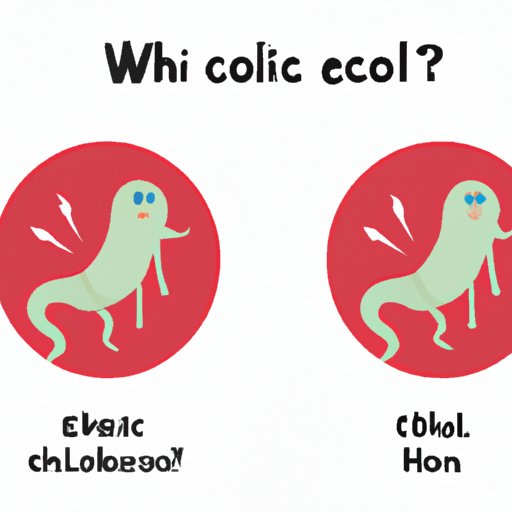
Introduction
E. coli infection is a bacterial illness that causes a wide range of symptoms, from mild to severe. This infection is caused by a bacterium, Escherichia coli, commonly found in the digestive tract of humans and animals. Most forms of E. coli are harmless or cause only mild illness. However, some strains can cause severe intestinal distress and even lead to potentially deadly complications. It is essential to understand the symptoms associated with E. coli infection to take necessary measures and seek immediate medical attention if necessary.
A Comprehensive Guide to Understanding the Symptoms of E. coli
Understanding E. coli symptoms is crucial in preventing the spread of the bacteria and seeking timely medical attention. E. coli symptoms vary depending on the specific strain of the bacteria, the infected individual’s age and health condition, and the extent of the infection.
Some people may not develop any symptoms after exposure to E. coli, while others may experience symptoms ranging from mild to severe. Symptoms can occur anywhere from 2 to 10 days after exposure, but typically symptoms appear within three or four days.
How to Recognize the Symptoms of E. coli Infection and Stay Safe
The symptoms of E. coli infection can mimic other illnesses, making it challenging to recognize. Symptoms can include:
- Watery or bloody diarrhea
- Abdominal cramping, pain, and tenderness
- Nausea and vomiting
- Fatigue and weakness
- Fever and chills
To stay safe, it is essential to take precautions when handling food, particularly by avoiding cross-contamination of raw and cooked food and washing hands frequently. Additionally, consuming undercooked meat, unpasteurized dairy products, and contaminated fruits and vegetables can also increase the risk of infection.
The Warning Signs of E. coli Infection: What You Need to Know
Common warning signs of E. coli infection include severe abdominal pain, dehydration, and low urine output. If you experience these symptoms, seek immediate medical attention as complications can lead to kidney failure and other serious health issues.
E. coli Symptoms: A Complete List and How to Manage Them
Here is a complete list of E. coli symptoms and how to manage them:
Watery or Bloody Diarrhea
Diarrhea is one of the most common symptoms of E. coli infection, and it can last for several days. If you experience diarrhea, it is essential to stay hydrated by drinking plenty of fluids and electrolyte solutions to replenish the lost nutrients. Avoid anti-diarrheal medications unless advised by a physician.
Abdominal Cramping, Pain, and Tenderness
Abdominal cramping and pain can be severe in some cases and make it challenging to perform daily activities. These symptoms can resolve on their own within a few days. However, over-the-counter (OTC) medications such as ibuprofen or acetaminophen may help manage the discomfort.
Nausea and Vomiting
While not everyone with E. coli infection experiences nausea or vomiting, these symptoms can occur in some cases. Sipping clear liquids, such as water, ginger ale, or clear broth, or applying a cold compress to your forehead and neck can help relieve nausea and vomiting.
Fatigue and Weakness
E. coli infection can cause fatigue and weakness, particularly during the recovery period from diarrhea. It is essential to take adequate rest and avoid demanding activities until the symptoms subside. Adequate hydration and nutrient-rich foods can also help restore energy levels.
Fever and Chills
Fever and chills can indicate a severe form of E. coli infection, such as the 0157:H7 strain or the E. coli infection that causes Hemolytic Uremic Syndrome (HUS). If your temperature exceeds 101.5°F, seek immediate medical attention.
Don’t Ignore the Signs: How to Identify E. coli Symptoms
It is crucial not to neglect the symptoms of E. coli infection, as they can worsen over time and lead to severe complications. It is advisable to see a doctor if you experience symptoms like bloody diarrhea, significant abdominal pain, dehydration, and low urine output.
Additionally, if you have a weak immune system or are in close contact with individuals who have these risk factors, it is crucial to seek medical advice without delay.
From Nausea to Diarrhea: Understanding the Common Symptoms of E. coli
Here is a detailed description of the most common symptoms of E. coli:
Diarrhea
Diarrhea is the most common symptom of E. coli infection and can range from mild to severe. In severe cases, diarrhea can lead to dehydration, which is the most severe complication of E. coli infection.
Abdominal Pain and Cramping
E. coli infection can cause severe abdominal pain and cramping. Pain can range from mild discomfort to severe, debilitating pain. The severity and duration of abdominal pain can vary, depending on the strain of the bacteria and the severity of the infection.
Nausea and Vomiting
While not everyone with E. coli infection experiences nausea or vomiting, these symptoms can occur in some cases. Nausea and vomiting are also common symptoms of other gastrointestinal illnesses.
Fatigue and Weakness
E. coli infection can cause fatigue and weakness, particularly during the recovery period from diarrhea. Fatigue and weakness are common symptoms of many other illnesses.
Fever and Chills
Some E. coli strains can cause fever and chills, particularly in severe cases that lead to kidney failure or other complications.
Conclusion
In conclusion, E. coli infection is a potentially severe gastrointestinal illness that can cause a wide range of symptoms, from mild to severe. Early recognition and management of symptoms are crucial in preventing complications and promoting recovery.
To stay safe, it is vital to take necessary precautions, such as washing hands frequently, avoiding cross-contamination of food, and consuming properly cooked food. If you experience E. coli symptoms, seek immediate medical attention to prevent severe complications and promote recovery.




